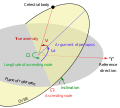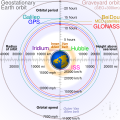rotational axis. Prograde or direct motion is more normal motion in the same direction as the primary rotates. However, "retrograde" and "prograde" can also...
42 KB (4,754 words) - 06:00, 1 June 2025
vantage point. Direct motion or prograde motion is motion in the same direction as other bodies. While the terms direct and prograde are equivalent in this...
12 KB (1,566 words) - 02:50, 21 February 2025
Prograde can refer to: Retrograde and prograde motion, in astronomy, a type of motion of astronomical bodies Metamorphism#Prograde and retrograde, in...
374 bytes (78 words) - 01:34, 10 February 2022
east to west along its ground track, in what is called "apparent retrograde" motion. This effect occurs because the satellite orbits more slowly than...
14 KB (1,948 words) - 19:20, 17 March 2025
A distant retrograde orbit (DRO), as most commonly conceived, is a spacecraft orbit around a moon that is highly stable because of its interactions with...
12 KB (1,174 words) - 16:53, 20 February 2025
In astronomy, Kepler's laws of planetary motion, published by Johannes Kepler in 1609 (except the third law, which was fully published in 1619), describe...
60 KB (8,838 words) - 04:04, 5 May 2025
Orbit (redirect from Orbital motion)
first order). A prograde or retrograde impulse (i.e. an impulse applied along the orbital motion) changes both the eccentricity and the orbital period...
57 KB (8,123 words) - 08:45, 4 June 2025
the normal orbit is prograde, an orbit in the same direction as the planet rotates. Inclinations greater than 90° describe retrograde orbits (backward)...
11 KB (1,470 words) - 02:33, 8 May 2025
plane of reference. The orbital inclination is 0° for prograde orbits, and π (180°) for retrograde ones.[citation needed] If the plane of reference is a...
5 KB (689 words) - 18:00, 15 March 2025
In orbital mechanics, mean motion (represented by n) is the angular speed required for a body to complete one orbit, assuming constant speed in a circular...
13 KB (1,900 words) - 01:47, 27 February 2023
than a point gravitational source, resulting in a non-closed orbit. A prograde relativistic shift happens because of relativistic effects from a massive...
3 KB (321 words) - 03:26, 27 September 2024
to the size of the orbit). As seen from Earth, the planet's orbital prograde motion makes the Sun appear to move with respect to other stars at a rate...
17 KB (1,860 words) - 12:44, 24 March 2025
is equatorial (in the same plane as the equator of Mars), circular, and prograde (rotating about Mars's axis in the same direction as the planet's surface)...
3 KB (374 words) - 00:13, 28 May 2025
astronomers are eclipses, apparent retrograde motion/planetary stations, planetary ingresses, sidereal time, positions for the mean and true nodes of the moon, the...
16 KB (1,700 words) - 00:10, 25 May 2025
discovery was made with the help of radial velocity measurements that showed retrograde apsidal precession of the brown dwarf pair, which could not be explained...
11 KB (1,231 words) - 07:37, 4 June 2025
life to reduce the probability of colliding with operational spacecraft and generating space debris. A graveyard orbit is used when the change in velocity...
9 KB (1,039 words) - 13:01, 7 June 2025
Moons of Jupiter (section Origin and evolution)
outer irregular satellites whose prograde and retrograde orbits are much farther from Jupiter and have high inclinations and eccentricities. The largest of...
122 KB (6,843 words) - 21:04, 27 May 2025
Earth). By convention, the inclination of a Prograde orbit is specified as an angle less than 90°. Retrograde orbit: An orbit counter to the direction of...
31 KB (3,455 words) - 19:37, 27 October 2024
inclination, allow rapid revisit times over low-latitude locations on Earth. Prograde equatorial LEOs also have lower delta-v launch requirements because they...
19 KB (2,128 words) - 02:29, 5 June 2025
In astronomy, perturbation is the complex motion of a massive body subjected to forces other than the gravitational attraction of a single other massive...
21 KB (2,425 words) - 08:15, 1 April 2025
sphere of influence. Motion in a patched-conic system is deterministic and simple to calculate, lending itself for rough mission design and "back of the envelope"...
12 KB (1,323 words) - 03:39, 23 April 2025
Hill sphere (section Example and derivation)
explain the preponderance of retrograde moons around Jupiter; however, Saturn has a more even mix of retrograde/prograde moons so the reasons are more...
47 KB (5,299 words) - 07:59, 30 May 2025
used reference planes and origins of longitude include: For geocentric orbits, Earth's equatorial plane as the reference plane, and the First Point of Aries...
5 KB (678 words) - 01:48, 25 September 2024
{GMm}{r^{2}}}={\frac {\mu m}{r^{2}}}} Thus only the product of G and M is needed to predict the motion of the smaller body. Conversely, measurements of the smaller...
15 KB (1,492 words) - 06:26, 25 May 2025
Jyotish Kepler's laws of planetary motion Occultation Parallax Retrograde and prograde motion Sidereal time Solstice Robin M. Green, Spherical Astronomy,...
6 KB (662 words) - 17:07, 22 October 2023
than the sidereal day of the planet. An Earth satellite that is in (a prograde) subsynchronous orbit will appear to drift eastward as seen from the Earth's...
2 KB (153 words) - 10:44, 31 July 2023
and celestial mechanics to rockets, satellites, and other spacecraft. The motion of these objects is usually calculated from Newton's laws of motion and...
40 KB (5,763 words) - 17:20, 4 June 2025
orbit (LEO) and below a high Earth orbit (HEO) – between 2,000 and 35,786 km (1,243 and 22,236 mi) above sea level. The boundary between MEO and LEO is an...
10 KB (1,037 words) - 23:27, 10 October 2024
Elliptic orbit (redirect from Elliptical motion)
the Sun are ellipses with the Sun at one focus, and described this in his first law of planetary motion. Later, Isaac Newton explained this as a corollary...
19 KB (2,744 words) - 16:48, 20 March 2025
provide stable orbits in the lunar vicinity, such as halo orbits and distant retrograde orbits. Some halo orbits remain over particular regions of the lunar...
16 KB (1,743 words) - 04:06, 11 May 2025

















